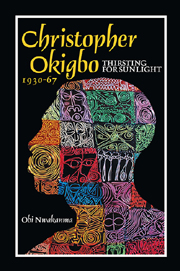Book contents
- Frontmatter
- Contents
- Preface
- Acknowledgements
- Chronology
- Dedication
- Photographs
- Maps
- Okigbo family tree
- 1 A river goddess, his mother's death & a headmaster father
- 2 Sportsman, actor & ‘effortless genius’
- 3 Cricket, classics, politics & urbane dissipation
- 4 Colonial civil servant, covert businessman & bankrupt
- 5 Poetry gives purpose to his voice
- 6 A librarian ravenous for literature & women
- 7 Gentleman, poet & publisher
- 8 Aftermath of a coup, running arms & advancing to death
- Epilogue
- Index
3 - Cricket, classics, politics & urbane dissipation
IBADAN 1950–56
Published online by Cambridge University Press: 05 April 2013
- Frontmatter
- Contents
- Preface
- Acknowledgements
- Chronology
- Dedication
- Photographs
- Maps
- Okigbo family tree
- 1 A river goddess, his mother's death & a headmaster father
- 2 Sportsman, actor & ‘effortless genius’
- 3 Cricket, classics, politics & urbane dissipation
- 4 Colonial civil servant, covert businessman & bankrupt
- 5 Poetry gives purpose to his voice
- 6 A librarian ravenous for literature & women
- 7 Gentleman, poet & publisher
- 8 Aftermath of a coup, running arms & advancing to death
- Epilogue
- Index
Summary
Me, away from home, runaway. Must leave the borders of our Land, fruitful fields must leave our homeland.
(‘Song of the Forest’, Four Canzones)The University College, Ibadan was established in 1948. For many years the colonial administration struggled to come to terms with the realities of demand for higher education in the English colonies. There was an immediate practical consideration for the formulators of colonial policy: the two great wars in Europe in the twentieth century had reduced the number of hands trained to run the far-flung empire. With the increasing cost in administration of the colonies, it was urgent to recruit a local elite who would assist in maintaining the objectives of the empire in the colonies; a local gentry, in other words, fashioned in the image of the English. In the post-war years, as the reality of independence dawned, it became even more necessary to train the indigenous elite for the administrative services of the post-colonial state. This policy was behind the founding of the Government Colleges, Yaba Higher College and eventually University College. By the end of the Second World War, agitation for wider opportunities in higher education had grown in the colonies. Yaba Higher College had been established in 1931 to offer limited diplomas. Many Nigerians desiring higher education either went abroad or took by correspondence the tedious external degrees offered by the University of London. Agitation continued until the Asquith and Eliot commissions recommended the establishment of the University Colleges in Ibadan and Legon to join Fourah Bay College in Freetown, Sierra Leone in catering for British West Africa, and Makerere in Uganda, for the East African colonies.
- Type
- Chapter
- Information
- Christopher Okigbo 1930–67Thirsting for Sunlight, pp. 61 - 97Publisher: Boydell & BrewerPrint publication year: 2010



